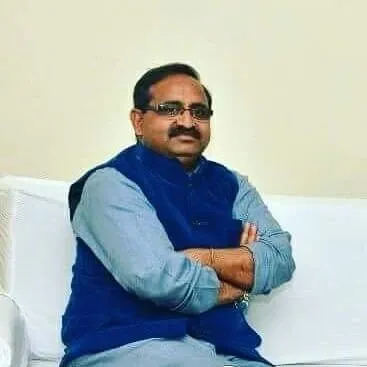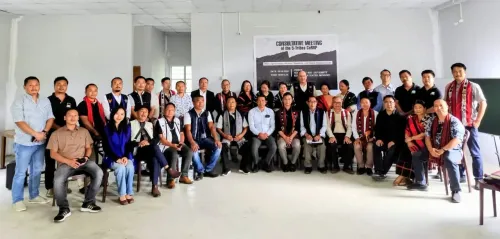Is Congress' Double Character on GST Slabs Exposed?

Synopsis
Key Takeaways
- GST reforms have introduced reduced tax rates for essential items.
- Congress party's contradictory stance has been highlighted by BJP leaders.
- A projected loss of Rs 1,000 crore in revenue for Himachal Pradesh.
- The Modi government aims to benefit various sectors through tax reductions.
- Public welfare remains a central theme in the ongoing political discourse.
Shimla, Sep 5 (NationPress) Himachal Pradesh BJP legislator Randhir Sharma on Friday criticized the Congress party for its contradictory stance, pointing out that during the GST Council meeting, finance ministers from Congress-led states supported the decisions made by the Centre for public welfare, yet later, after discussions with Rahul Gandhi, they opposed these reforms in their own states.
He stated that State Industry Minister Harshwardhan Chauhan also rejected measures designed to provide relief to the public, labeling this behavior as revealing the anti-people nature of Congress.
Chauhan expressed worries on Thursday regarding a projected revenue shortfall of Rs 1,000 crore for the state, which is already grappling with financial difficulties.
In response, BJP media in-charge Sharma remarked, “We urge Congress leaders to consider the benefits of reforms that are advantageous to every citizen of Himachal Pradesh while discussing the state's revenue. Their inability to think constructively stems from the fact that during their tenure, they have not made a single decision in the public’s favor.
“With their series of anti-people policies, they have placed an economic burden on the citizens of Himachal Pradesh. Consequently, they struggle to accept the historic public-interest decisions made by the Central government. To boost revenue, it is essential to foster investments and industrial growth in Himachal Pradesh, which will simultaneously elevate job opportunities,” he stated.
Supporting his claims with statistics, Sharma highlighted that under Congress governance, a 27 percent tax was imposed on essentials like toothpaste, soap, and mineral water, while now it has been significantly lowered to just five percent. Furthermore, everyday items such as bicycles, sewing machines, and puja materials have become more affordable. Taxes on goods like televisions, refrigerators, washing machines, and vehicles have also seen substantial reductions.
He emphasized that the Modi government has not only relieved the middle class and homemakers but has also facilitated substantial support for farmers and patients, with taxes on medical equipment, health insurance, and tractor tires reduced to nearly zero.
Sharma noted that during his Independence Day address from the Red Fort on August 15, the Prime Minister discussed the government's commitment to introducing next-generation reforms in GST. Under his effective leadership, in merely 20 days, the GST Council executed historic reforms, either abolishing or lowering taxes on all essential items.
In the revised GST framework, the 28 percent and 12 percent tax slabs have been eliminated, leaving only two slabs – five percent and eighteen percent,” added the BJP leader.
In contrast, Congress minister Chauhan acknowledged the benefits of lowering GST rates, stating, “This is a positive move that will provide relief to the general populace and reduce costs. However, it will also lead to decreased revenue for Himachal.”
He projected that the alteration in GST slabs would result in a loss of approximately Rs 1,000 crore.









